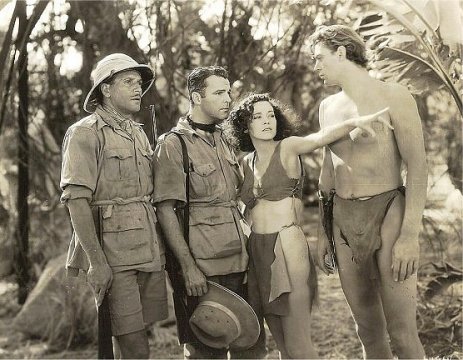 Today,
when we catch old black and white Weissmuller/O’Sullivan flicks on Turner
Classics, many of us experience a wide variety of emotions. For those of
us old enough to have seen the originals in theaters the nostalgia can
be overwhelming. Tarzan the Ape Man (1932) and Tarzan
and His Mate (1934) were groundbreaking epics that not only changed
the rules of moviemaking, but shattered box-office records. For audiences
that had only recently experienced their first “talkie,” the sight of the
next-to-naked Tarzan and Jane swinging through the jungle canopy, riding
elephants, fighting hand-to-hand with wild beasts, having a chimp for a
pet and cannibals as vicious enemies was shocking, exotic and altogether
thrilling.
Today,
when we catch old black and white Weissmuller/O’Sullivan flicks on Turner
Classics, many of us experience a wide variety of emotions. For those of
us old enough to have seen the originals in theaters the nostalgia can
be overwhelming. Tarzan the Ape Man (1932) and Tarzan
and His Mate (1934) were groundbreaking epics that not only changed
the rules of moviemaking, but shattered box-office records. For audiences
that had only recently experienced their first “talkie,” the sight of the
next-to-naked Tarzan and Jane swinging through the jungle canopy, riding
elephants, fighting hand-to-hand with wild beasts, having a chimp for a
pet and cannibals as vicious enemies was shocking, exotic and altogether
thrilling.
Flash forward thirty years to the 1950s and 60s. Television “sets” were
in nearly every home, and those old Tarzan films became a late night staple.
All at once, another couple of generations of film lovers became exposed
to those classics. How many pre-pubescent girls (like myself) marveled
at the gorgeous, muscular, loincloth-clad Johnny Weissmuller and the gorgeous
Miss Maureen O’Sullivan sharing jungle adventures we could only conjure
in our wildest dreams? But it wasn’t just the girls who loved this stuff.
Young boys suddenly had a superhero they could relate to and it was common
for them to emulate their hero on occasion, beating their chest and yodeling
out the famous Tarzan yell.
Then, a couple of decades later, things went horribly wrong thanks to
John and Bo Derek’s Tarzan the Ape Man (1981). The luscious
Bo, as a sassy Jane, attempted a retelling of the familiar story from her
point of view.
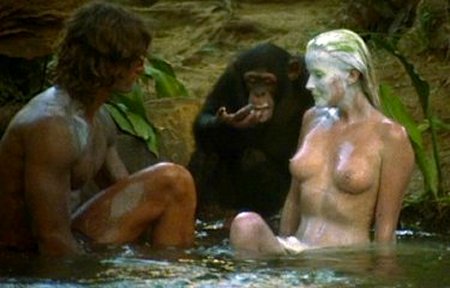
She stayed naked for most of the movie, and the hunk, Miles O’Keefe
as Tarzan was not allowed to utter one single word. Maybe it was better
that way. The script was execrable. It was painful watching poor Richard
Harris muddle through his lines in the most embarrassing movie of his career.
The Dereks’ disgrace was quickly forgotten.
While there were other feature film Tarzans between the 30s and the
80s (Buster Crabbe, Lex Barker and Gordon Scott to name a few), they were
flashes in the pan. Johnny and Maureen had been seared into the collective
unconscious.
Then in 1984 came Greystoke: The Legend of Tarzan, Lord of the
Jungle. The anticipation and excitement upon hearing of a new Tarzan
movie, directed by the recent Oscar winner Hugh Hudson (Chariots
of Fire) had everyone who’d ever had a Tarzan or Jane fantasy lining
up around the block for what promised to be a lush, classy Technicolor
extravaganza. Expectations were sky high.
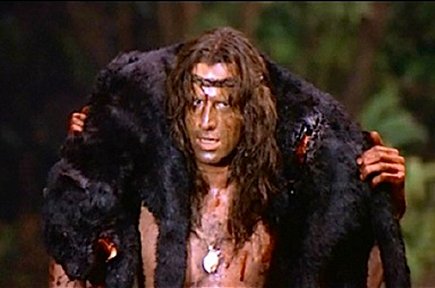
We paid our $4.00 (!), bought our popcorn, the lights went down and
we settled in for the ride. The opening, with John and Alice Clayton --
Lord and Lady Greystoke -- castaways on an African beach, their ingeniously
built tree house, a heart-stopping attack by gorilla-like creatures ending
in their murder, and the rescue of their son -- held us rapt. Watching
the naked child-gone-feral in the care of these apes … we were still in
a happy state of suspended disbelief. The boy grew into the lankily gorgeous
and sultry Christopher Lambert, and now audiences were starting to get
edgy … soon Jane Porter would appear, and the jungle romance would begin.
But she didn’t appear.
The expedition that invaded Tarzan's jungle included only men. Most
of us didn’t realize that the Frenchman, D’Arnot, played by Ian Holm, was
one of the most faithful elements of Burroughs’ first novel, Tarzan
of the Apes. D’Arnot is badly injured by cannibals, Tarzan nurses
him back to health and in turn he teaches the ape man French as a first
language. But this protracted sequence, complete with tender male bonding,
was starting to make moviegoers nervous. Half the movie was over. Where
the hell was Jane?!
Next thing we know D’Arnot has Tarzan dressed in turn-of-the-century
finery and takes him back to England to claim his birthright as Lord Greystoke.
Something was very, very wrong, but there we all were sitting in the dark
getting more and more frustrated with every passing moment.
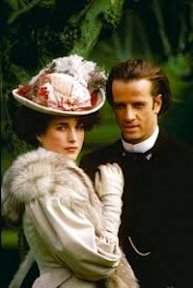 Finally, Jane appears
on the grand staircase of an English mansion and the meeting with Tarzan
(henceforth called by his proper name, John Clayton) takes place. We were
momentarily placated by the delicate beauty of Andie McDowell in her high-neck
Victorian lace (not knowing then that every word of her dialogue had been
re-dubbed by Glenn Close). But as the minutes dragged by, all hopes of
the couple somehow returning to Africa for a rumble in the jungle died.
The action is limited to John Clayton trying to acclimate to civilized
life. Perhaps the most memorable moment comes when John sneaks into Jane’s
canopied bed and before ravishing her hops around making chimp noises and
sniffing her. In the remaining screen time, John visits the Natural History
Museum and sees a chimp that’s been eviscerated by vivisectionists; he
also witnesses his ape “father” being shot and killed.
Finally, Jane appears
on the grand staircase of an English mansion and the meeting with Tarzan
(henceforth called by his proper name, John Clayton) takes place. We were
momentarily placated by the delicate beauty of Andie McDowell in her high-neck
Victorian lace (not knowing then that every word of her dialogue had been
re-dubbed by Glenn Close). But as the minutes dragged by, all hopes of
the couple somehow returning to Africa for a rumble in the jungle died.
The action is limited to John Clayton trying to acclimate to civilized
life. Perhaps the most memorable moment comes when John sneaks into Jane’s
canopied bed and before ravishing her hops around making chimp noises and
sniffing her. In the remaining screen time, John visits the Natural History
Museum and sees a chimp that’s been eviscerated by vivisectionists; he
also witnesses his ape “father” being shot and killed.
In the last few frames of “Greystoke,” Jane finally makes it to Africa,
but only to return the too-wild-for-civilization John Clayton to his jungle
home. What the hell?!! How on earth had the filmmakers been allowed to
go so wrong? No one loved the movie. It might have been a box office success,
but it was a critical failure. The best that those people who had waited
breathlessly for its release could say was, “The first half was good.”
After Greystoke Hollywood closed up shop on Tarzan features for almost
fifteen years. Columbia/Tri-Star and Warner Brothers tiptoed back with
Starship
Troopers hunk Casper Van Dien as the ape man and English actress
Jane March playing her namesake in Tarzan and the Lost City
(1998).
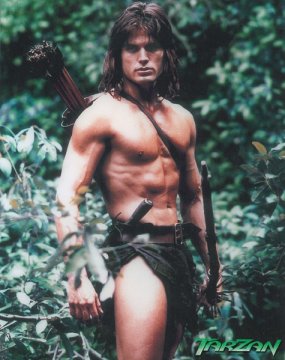
While this iteration had an intelligent, well-spoken English lord returning
to save his beloved jungle, the special effects were corny. It was decidedly
a B movie and caused hardly a ripple among Tarzan devotees.
Meanwhile, Disney, riding a tsunami of wildly successful animated features,
sent the Lord of the Vine swinging back into popular culture with their
Tarzan
(1999), a film that won critical acclaim for its musical score by Phil
Collins and a rich new animation technique called “Deep Canvas,” as well
as achieving blockbuster status worldwide.
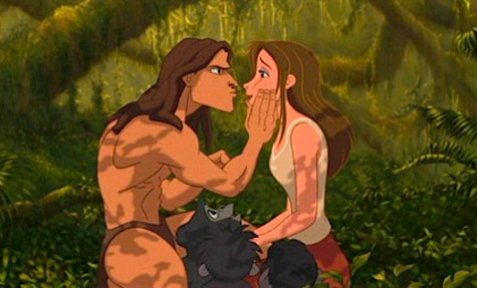
The studio followed that success a year later with the goofy but loveable
live action Tarzan spoof, George of the Jungle starring Brendan
“Watch out for that tree!” Fraser—another hit for Disney.
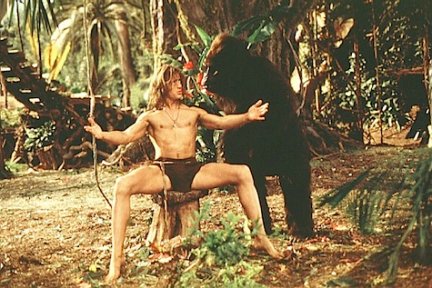
Sadly, the old Tarzan crowd was a bit long in the tooth for animation
and kiddie comedy, and disenchanted with Hollywood’s attempts to revive
their beloved hero.
Enter Warner Brothers. Determined to reboot the live action Tarzan legacy,
in 2006 they optioned the rights from the Edgar Rice Burroughs estate,
with mega-producer Jerry Weintraub at the helm, Guillermo del Toro (Hellboy)
set to direct and Master and Commander scribe John Collee
hired to write it. A mere two years later, the team was replaced by the
powerhouses behind Pirates of the Caribbean series, director
Steve Sommers and screenwriter Stuart Beattie. Three years on, another
plan of attack was announced by Warner Brothers—the writer/director Craig
Brewer (Hustle and Flow and Footloose II) and
screenwriter Adam Cozad, screenwriter for the Jack Ryan reboot were hired
to simultaneously write two separate scripts, one to hit the big screen
first, the other a sequel. And just within the last month there have been
rumblings that Harry Potter director David Yates and HBO’s
Generation Kill director Susanna White were in talks with the studio, though
executives have remained tight-lipped about it all.
An overview of online comments reacting to the various announcements
of writer/director choices (and even the prospect of a new Tarzan movie
being produced at all) finds that a fair share of the commenters (ones
with the most passionate opinions) are devotees of the ERB Tarzan novels.
All but a few would like to see the books faithfully rendered onscreen,
with Tarzan portrayed either as the “noble savage” who speaks eight languages
fluently and moves easily between the jungle and civilization, or simply
as a savage (as written in one Burroughs’ novel—ripping out an enemy’s
throat with his teeth). Interestingly, in a recent interview Tarzan devotee
Dr. Jane Goodall (who read the novels as a young girl) admitted that a
recent re-reading of the books unhappily surprised her in terms of Tarzan’s
violence, both to humans and to animals.
Many of the purists despised Weissmuller’s dumbed-down Tarzan, and most
had doubts that any of the new writer/director teams could do justice to
the original material, even with 3D CGI at their disposal. One suggested
that since Peter Jackson had so faithfully adapted Tolkein’s Lord
of the Rings (and later King Kong) to the big screen,
he would be an ideal choice to direct. A few commenters despaired altogether,
saying it would be best not to try at all, lest another failure take down
the screen legacy forever. We will, however, be adding a ninety-ninth feature
to the list in 2013. The German production company Constantin Film’s Tarzan
and Jane, a motion capture version starring Twilight’s
Kellen Lutz and actress Spencer Locke (Resident Evil) is
in production now.
Al and Allison Bohl’s brilliant new documentary Tarzan, Lord of
the Louisiana Jungle describes the making of the very first ape
man flick, the silent motion picture Tarzan of the Apes (1918)
shot entirely in the swamps of Morgan City, Louisiana, complete with real
wild animals…there were even rumors that the star, Elmo Lincoln, actually
killed a lion. The two-disc set comes with a copy of the silent film, complete
with a new musical score., and it’s fascinating to see how it all started.
At the recent Tarzan Centennial Celebration last month in Tarzana, CA,
a rumor began circulating that Olympic gold medalist Michael Phelps had
been chosen to play Tarzan for Warner Brothers live action movie, though
happily the gossip soon fizzled. But legitimate news that not five months
ago the same studio had signed Harry Potter writer Steve
Kloves to write and direct a live action version of Rudyard Kipling’s feral-boy
classic, The Jungle Book brings up further complexities and
difficulties surrounding any attempts to bring a new Tarzan classic feature
to fruition.
We die-hard fans just keep hoping for the one that will knock it out
of the park.
Follow Robin Maxwell's Tarzan articles at TOR.com
Robin Maxwell is the author of Jane: The Woman Who Loved Tarzan.
It is the first Tarzan classic ever written by a woman and the first from
Jane’s point of view. Coinciding with the Tarzan Centennial Year, it is
fully authorized by the estate of Edgar Rice Burroughs.


![]()

![]()
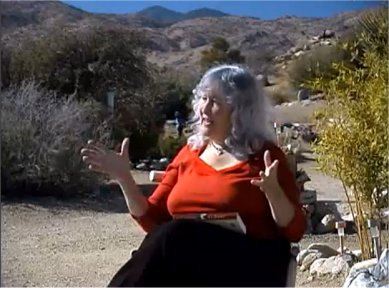
![]()
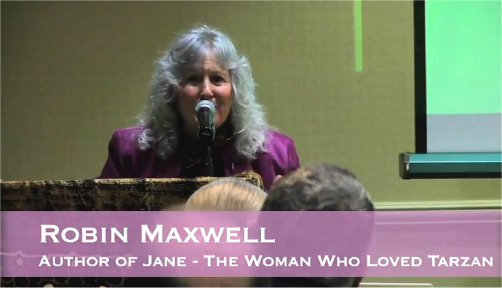
![]()
![]()

![]()